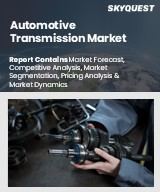
|
시장보고서
상품코드
1630554
자동차 변속기 시장 : 유형별, 차량 유형별, 추진동력별, 지역별, 기회 및 예측(2018-2032년)Automotive Transmission Market Assessment, By Type, By Vehicle Type, By Propulsion, By Region, Opportunities and Forecast, 2018-2032F |
||||||
세계의 자동차 변속기 시장 규모는 2025-2032년의 예측 기간 동안 6.06%의 연평균 복합 성장률(CAGR)로 2024년 640억 7,000만 달러에서 2032년 1,025억 8,000만 달러로 성장할 것으로 예측됩니다. 자동차 변속기 시장의 성장은 듀얼 클러치 변속기(DCT)와 무단변속기(CVT)와 같은 기술 발전, 개발, 혁신 등 몇 가지 주요 요인에 의해 영향을 받고 있습니다. 효율적인 전력 분배를 필요로 하는 현대 전기차와 하이브리드 차량에 필수적인 기어 변속 시간 단축과 우수한 전력 관리로의 전환이 진행되고 있습니다. 연료 가격 상승과 엄격한 배기가스 규제로 인해 엔진 성능을 최적화하고 연료 소비를 줄이는 저연비 차량을 찾는 소비자가 증가하면서 예측 기간 동안 자동차 변속기 시장의 세계 수요를 견인할 것으로 예상됩니다.
또한, 전기자동차의 성장으로 전동화 변속기 시스템에 대한 수요도 변화하고 있습니다. 전기자동차는 일반적으로 효율성을 높이는 단일 속도 변속기를 포함한 혁신적인 기술을 탑재하고 있습니다. 신흥국의 자동차 생산량 증가는 다양한 유형의 변속기 시스템에 대한 수요 급증과 관련이 있습니다. 소비자 취향의 변화로 인해 보다 부드러운 주행 경험에 대한 수요가 증가하면서 주행 역학을 향상시키는 첨단 변속기 기술에 대한 수요도 증가하고 있습니다. 마지막으로, 저연비 및 저배출 차량에 대한 정부 규제와 인센티브는 이 표준을 충족하는 첨단 변속기 시스템에 대한 수요 증가와 직결됩니다. 전반적으로, 제조업체들이 수요와 규제 프레임워크 측면에서 소비자 기준의 변화에 대비하고 있기 때문에 시장은 견조한 성장을 보일 것으로 예상됩니다.
이 보고서는 세계의 자동차 변속기 시장을 조사했으며, 시장 개요와 함께 유형별, 차량 유형별, 추진력별, 지역별 동향, 시장 진출기업 프로파일 등의 정보를 제공합니다.
목차
제1장 프로젝트의 범위와 정의
제2장 조사 방법
제3장 주요 요약
제4장 고객의 소리
제5장 세계의 자동차용 변속기 시장 전망, 2018년-2032년
- 시장 규모 분석과 예측
- 시장 점유율 분석과 예측
- 시장 맵 분석, 2024년
- 유형별
- 차량 유형별
- 추진력별
- 지역별
제6장 북미 자동차용 변속기 시장 전망, 2018년-2032년
제7장 유럽 자동차용 변속기 시장 전망, 2018년-2032년
제8장 아시아태평양 자동차용 변속기 시장 전망, 2018년-2032년
제9장 남미 자동차용 변속기 시장 전망, 2018년-2032년
제10장 중동 및 아프리카 자동차용 변속기 시장 전망, 2018년-2032년
제11장 수급 분석
제12장 수출입 분석
제13장 밸류체인 분석
제14장 Porter의 Five Forces 분석
제15장 PESTLE 분석
제16장 가격 분석
제17장 시장 역학
제18장 시장 동향과 발전
제19장 사례 연구
제20장 경쟁 구도
- 시장 리더 TOP 5경쟁 매트릭스
- 참여 기업 TOP 5SWOT 분석
- 시장 진출기업 TOP 10상황
- Magna International Inc.
- STELLANTIS N.V.
- ZF Friedrichshafen AG
- Continental AG
- AISIN CORPORATION
- JATCO Ltd
- Eaton Corporation plc
- BorgWarner Inc.
- Vitesco Technologies GmbH
- GKN Automotive Limited
제21장 전략적 제안
제22장 문의와 면책사항
LSH 25.01.22Global automotive transmission market is projected to witness a CAGR of 6.06% during the forecast period 2025-2032, growing from USD 64.07 billion in 2024 to USD 102.58 billion in 2032. The growth of the automotive transmission market is influenced by several key factors, including technological advancements, developments, or innovations, such as dual-clutch transmissions (DCTs) and continuously variable transmissions (CVTs). Vehicles are moving towards lower gear shift times and better power management, essential in modern-day electric and hybrid vehicles that need efficient power distribution. More consumers demand fuel-efficient vehicles featuring optimized engine performance and reduced fuel consumption due to rising fuel prices and strict emission regulations, driving the global automotive transmission market demand in the forecast period. Additionally, the growth of electric vehicles provides a different need for electrified transmission systems; an electric vehicle usually features innovative technologies, including single-speed transmissions, that enhance efficiency. Increased production rates of vehicles within emerging economies are related to the surge in demand for various types of transmission systems. Changing consumer preferences also lead to a demand for smoother driving experiences, driving the demand for advanced transmission technologies as they improve driving dynamics. Lastly, government regulations and incentives prompting the adoption of fuel-efficient and low-emission vehicles will directly relate to increased demand for advanced transmission systems that comply with this standard. Overall, the market is expected to grow robustly as manufacturers prepare for the changes in consumer standards in terms of demand and regulatory frameworks.
For instance, in October 2022, Magna International Inc. and STELLANTIS N.V. developed a 48-volt hybrid dual-clutch transmission for the Jeep Renegade and Compass e-Hybrid, Fiat 500 X, and Tipo. This 7-speed transmission delivers up to 320 Nm of torque and employs torque-split technology for optimized efficiency between the combustion engine and the e-motor.
Rise of Electric Vehicles is Expanding the Global Market Scope
Electric vehicles are predominantly changing the dynamics in the automotive transmission market scope, extending their benefits through the increase in the usage of electric vehicles, environmental concerns, and the recent governmental regulatory policies that act towards minimizing emissions. Various governments around the world are pushing for cleaner air, resulting in increased demand for electric vehicles, which would also drive the growth of the electric vehicle transmission market. This market can be segmented based on single-speed or multispeed types of transmissions. Thus far, single-speed systems dominate sales because they are high-performance and low-cost. However, multispeed transmissions will come into the market as consumers opt for more performance-oriented electrified vehicles; they will improve efficiency at higher-speed conditions. Moreover, innovations around transmission technologies are being introduced to cater to emerging requirements in electric propulsion. For instance, electrified e-transmissions for commercial vehicles are being emphasized by companies towards the provision of high efficiency, carbon emission, and high performance. Generally, the increased demand for electric vehicles leads to demand for the relevant transmission technologies and, thus, the future of the whole automotive industry.
For instance, in July 2024, STELLANTIS N.V. extended the benchmark hybrid powertrain to more nameplates to satisfy European customer demand. The company will offer Innovative electrified dual-clutch transmissions (eDCT) with supreme performance as an affordable hybridization technology.
Technological Advancements Propel the Global Market Growth
Rapid technological advancement is propelling unprecedented growth for the global automotive transmission market. From a broad array of innovations contributing to improved performance, efficiency, and smooth driving experiences, the most impactful development is the integration of advanced transmission technologies such as continuously variable transmissions (CVTs), dual-clutch transmissions (DCTs), and automated manual transmissions (AMTs). In addition, with growing awareness of environmental issues and fuel economy standards, these technologies fulfill the interests of consumers and car makers. CVTs provide constant acceleration without delaying changes in shifting gears. Particularly beneficial in urban areas, such settings remove the delays from shifting. Most recently introduced modern transmission control units have high-precision digital intelligence and can detect the optimal operating point of the engine for its performance making quicker shifts and smoother gear changes possible, to enhance performance and driver satisfaction. The integration of artificial intelligence (AI) and machine learning also boosts the market; these technologies could analyze real-time data to anticipate future maintenance and refine gear shifts, thereby improving fuel efficiency and delivering a more responsive driving experience. Overall, these technological advancements are reshaping the automotive transmission landscape, creating new opportunities for growth in the market as manufacturers strive to meet evolving consumer preferences and regulatory demands.
For instance, in October 2024, JATCO Ltd newly developed a performance-restoring additive for continuously variable transmission (CVT) fluid. This newly developed additive is designed to be added to the CVT fluid of existing CVTs and hybrid electric vehicles. Now, the shock when engaging/disengaging the wet clutch can be reduced, and the durability of the wet clutch can be restored to a level equivalent to that of a full CVT fluid change.
Dominance of Passenger Cars in Global Market
The dominance of passenger cars in the global automotive transmission market is due to continuous advancements in transmission technologies, such as continuously variable transmissions (CVTs), dual-clutch transmissions (DCTs), and automatic transmissions, which are increasingly being integrated into passenger vehicles. These technologies enhance fuel efficiency, performance, and driver comfort, increasing their popularity. Automatic transmissions are favored for their ease of use and improved performance, which appeals to a broad range of consumers; as economic conditions improve, more consumers opt for personal vehicles. Manufacturers are also focusing on enhancing their offerings for passenger cars by integrating advanced transmission technologies to meet consumer demands for performance and efficiency.
For instance, in August 2024, Hero MotoCorp Limited was in talks with a German company for transmission systems joint venture to achieve vertical integration in manufacturing transmission systems. Also, it has signed a term sheet for another collaboration, also with a German firm, for a licensing agreement to manufacture dual-clutch transmissions for passenger cars.
Asia-Pacific Dominates Global Automotive Transmission Market Share
Asia-Pacific dominates the global automotive transmission market due to the presence of leading automobile manufacturers and suppliers in countries such as China, India, Japan, and South Korea. Being the major producers of vehicles, they also play a crucial role in the supply chain for automotive components worldwide. Growing passenger and commercial vehicles across emerging countries also drive the demand for automotive transmission. An increase in urbanization and logistics operations means that better transmission systems will be needed to operate in the future. Moreover, stringent government regulations on emissions and fuel consumption push manufacturers to adopt advanced transmission technologies. This regulatory environment encourages Automated Manual Transmission (AMT) development and other similar efficient systems that consume lower fuel and produce less CO2 without compromising vehicle performance. The trend is also quite notable concerning the rising number of electric vehicle (EV) adopters, where more vehicles would require special transmission systems for electric power trains. All these effects further drive the importance of Asia-Pacific in the global automotive landscape, driven by robust demand, technological advancements, and regulatory support.
For instance, in December 2023, ZF Friedrichshafen AG expanded the local production of transmissions and axles in Coimbatore, India. The expansion includes a new plant catering to domestic and selected export automotive transmission markets.
Future Market Scenario (2025-2032F)
Enhanced optimization of transmission systems through real-time data analysis for improved efficiency and predictive maintenance by integration of artificial intelligence will enhance vehicle performance.
Adoption of lightweight materials in transmission components to meet regulatory standards while improving vehicle performance.
The shift in consumer preferences toward electric and hybrid vehicle options will play a crucial role.
Key Players Landscape and Outlook
The global automotive transmission market is characterized by a competitive landscape featuring several key players that are instrumental in driving growth and innovation. These players leverage their technological expertise and extensive global networks to maintain competitive advantages and respond to evolving market demands, largely driven by the increasing adoption of electric and hybrid vehicles, which require advanced transmission systems for optimal performance and efficiency. The shift towards these vehicles is influenced by stringent government regulations to reduce greenhouse gas emissions, prompting manufacturers to innovate in areas such as automatic and continuously variable transmissions (CVTs). Key strategies these major players employ include mergers and acquisitions, partnerships, and significant investments in research and development to enhance product offerings.
For instance, in September 2024, ZF Friedrichshafen AG and Beiqi Foton Motor Co., Ltd. expanded their strategic partnership to hybrid transmission for the Chinese market. This joint venture is set up to deliver the TraXon automatic transmission and electric drives in China. Under the agreement, ZF Friedrichshafen AG will further develop the new hybrid automated manual transmission system TraXon 2 Hybrid for heavy-duty trucks, while the joint venture will manufacture the hybrid transmission.
Table of Contents
1. Project Scope and Definitions
2. Research Methodology
3. Executive Summary
4. Voice of Customer
- 4.1. Product and Market Intelligence
- 4.2. Brand Awareness
- 4.3. Factors Considered in Purchase Decisions
- 4.3.1. Features and Other Value-Added Service
- 4.3.2. Compatibility and Vehicle Type
- 4.3.3. Efficiency of Solutions
- 4.3.4. After-Sales Support
- 4.4. Consideration of Regulations
5. Global Automotive Transmission Market Outlook, 2018-2032F
- 5.1. Market Size Analysis & Forecast
- 5.1.1. By Value
- 5.1.2. By Volume
- 5.2. Market Share Analysis & Forecast
- 5.2.1. By Type
- 5.2.1.1. Manual Transmission
- 5.2.1.2. Automatic Transmission
- 5.2.1.3. Automated Manual Transmission (AMT)
- 5.2.1.4. Dual-Clutch Transmission (DCT)
- 5.2.1.5. Continuously Variable Transmissions (CVT)
- 5.2.2. By Vehicle Type
- 5.2.2.1. Passenger Cars
- 5.2.2.2. Commercial Vehicles
- 5.2.3. By Propulsion
- 5.2.3.1. Internal Combustion Engine
- 5.2.3.2. Electric
- 5.2.4. By Region
- 5.2.4.1. North America
- 5.2.4.2. Europe
- 5.2.4.3. Asia-Pacific
- 5.2.4.4. South America
- 5.2.4.5. Middle East and Africa
- 5.2.5. By Company Market Share Analysis (Top 5 Companies and Others - By Value, 2024)
- 5.2.1. By Type
- 5.3. Market Map Analysis, 2024
- 5.3.1. By Type
- 5.3.2. By Vehicle Type
- 5.3.3. By Propulsion
- 5.3.4. By Region
6. North America Automotive Transmission Market Outlook, 2018-2032F*
- 6.1. Market Size Analysis & Forecast
- 6.1.1. By Value
- 6.1.2. By Volume
- 6.2. Market Share Analysis & Forecast
- 6.2.1. By Type
- 6.2.1.1. Manual Transmission
- 6.2.1.2. Automatic Transmission
- 6.2.1.3. Automated Manual Transmission (AMT)
- 6.2.1.4. Dual-Clutch Transmission (DCT)
- 6.2.1.5. Continuously Variable Transmissions (CVT)
- 6.2.2. By Vehicle Type
- 6.2.2.1. Passenger Cars
- 6.2.2.2. Commercial Vehicles
- 6.2.3. By Propulsion
- 6.2.3.1. Internal Combustion Engine
- 6.2.3.2. Electric
- 6.2.4. By Country Share
- 6.2.4.1. United States
- 6.2.4.2. Canada
- 6.2.4.3. Mexico
- 6.2.1. By Type
- 6.3. Country Market Assessment
- 6.3.1. United States Automotive Transmission Market Outlook, 2018-2032F*
- 6.3.1.1. Market Size Analysis & Forecast
- 6.3.1.1.1. By Value
- 6.3.1.1.2. By Volume
- 6.3.1.2. Market Share Analysis & Forecast
- 6.3.1.2.1. By Type
- 6.3.1.2.1.1. Manual Transmission
- 6.3.1.2.1.2. Automatic Transmission
- 6.3.1.2.1.3. Automated Manual Transmission (AMT)
- 6.3.1.2.1.4. Dual-Clutch Transmission (DCT)
- 6.3.1.2.1.5. Continuously Variable Transmissions (CVT)
- 6.3.1.2.2. By Vehicle Type
- 6.3.1.2.2.1. Passenger Cars
- 6.3.1.2.2.2. Commercial Vehicles
- 6.3.1.2.3. By Propulsion
- 6.3.1.2.3.1. Internal Combustion Engine
- 6.3.1.2.3.2. Electric
- 6.3.1.2.1. By Type
- 6.3.1.1. Market Size Analysis & Forecast
- 6.3.2. Canada
- 6.3.3. Mexico
- 6.3.1. United States Automotive Transmission Market Outlook, 2018-2032F*
All segments will be provided for all regions and countries covered
7. Europe Automotive Transmission Market Outlook, 2018-2032F
- 7.1. Germany
- 7.2. France
- 7.3. Italy
- 7.4. United Kingdom
- 7.5. Russia
- 7.6. Netherlands
- 7.7. Spain
- 7.8. Turkey
- 7.9. Poland
8. Asia-Pacific Automotive Transmission Market Outlook, 2018-2032F
- 8.1. India
- 8.2. China
- 8.3. Japan
- 8.4. Australia
- 8.5. Vietnam
- 8.6. South Korea
- 8.7. Indonesia
- 8.8. Philippines
9. South America Automotive Transmission Market Outlook, 2018-2032F
- 9.1. Brazil
- 9.2. Argentina
10. Middle East and Africa Automotive Transmission Market Outlook, 2018-2032F
- 10.1. Saudi Arabia
- 10.2. UAE
- 10.3. South Africa
11. Demand Supply Analysis
12. Import and Export Analysis
13. Value Chain Analysis
14. Porter's Five Forces Analysis
15. PESTLE Analysis
16. Pricing Analysis
17. Market Dynamics
- 17.1. Market Drivers
- 17.2. Market Challenges
18. Market Trends and Developments
19. Case Studies
20. Competitive Landscape
- 20.1. Competition Matrix of Top 5 Market Leaders
- 20.2. SWOT Analysis for Top 5 Players
- 20.3. Key Players Landscape for Top 10 Market Players
- 20.3.1. Magna International Inc.
- 20.3.1.1. Company Details
- 20.3.1.2. Key Management Personnel
- 20.3.1.3. Products and Services
- 20.3.1.4. Financials (As Reported)
- 20.3.1.5. Key Market Focus and Geographical Presence
- 20.3.1.6. Recent Developments/Collaborations/Partnerships/Mergers and Acquisitions
- 20.3.2. STELLANTIS N.V.
- 20.3.3. ZF Friedrichshafen AG
- 20.3.4. Continental AG
- 20.3.5. AISIN CORPORATION
- 20.3.6. JATCO Ltd
- 20.3.7. Eaton Corporation plc
- 20.3.8. BorgWarner Inc.
- 20.3.9. Vitesco Technologies GmbH
- 20.3.10. GKN Automotive Limited
- 20.3.1. Magna International Inc.
Companies mentioned above DO NOT hold any order as per market share and can be changed as per information available during research work.



















